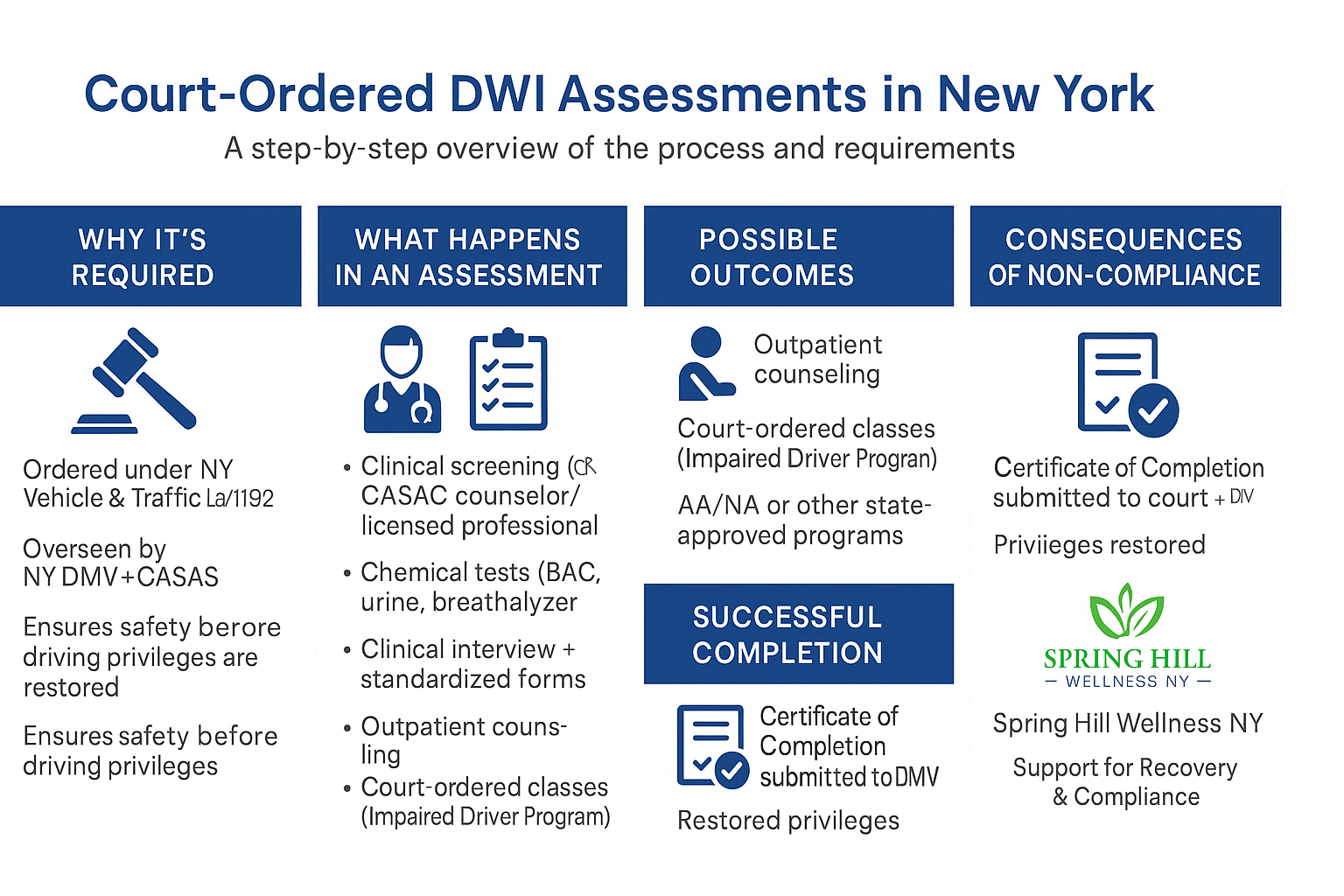How to Complete a Court-Ordered DWI Assessment in Manhattan
A court-ordered DWI assessment in New York is a mandatory evaluation for individuals facing DWI or DWAI charges. This process, overseen by the DMV and OASAS, determines treatment needs, supports public safety, and is often required before driving privileges can be restored.

Understanding Court-Ordered DWI Assessments in New York
A court-ordered DWI assessment in Manhattan, NY is a mandatory step for individuals facing Driving While Intoxicated (DWI) or Driving While Ability Impaired (DWAI) charges. Under New York State Vehicle and Traffic Law (VTL 1192), courts may require a drug and alcohol evaluation to determine if the individual shows signs of substance abuse dependency. This process plays a critical role in public safety, ensuring that drivers receive proper treatment programs and education before regaining full driving privileges.
The New York State Department of Motor Vehicles (DMV) and the Office of Addiction Services and Supports (OASAS) oversee much of this process through the Impaired Driver Program (IDP). Participation may be required to lift an Order of Suspension or Revocation and restore a conditional license.
Types of DWI Charges and Their Impact
New York courts classify DWI charges into several categories, each carrying different consequences:
- First-time offenses may lead to mandatory substance abuse evaluations and court-ordered programs.
- Repeat offenses or cases involving Vehicular Assault or Vehicular Manslaughter can result in more intensive rehabilitation center referrals, longer suspensions, or incarceration.
- Aggravated DWI charges often require stricter compliance with court ordered requirements, including longer monitoring by probation officers.
In Manhattan, cases are handled by the New York County Supreme Court and New York City Criminal Court, where court officials decide the extent of mandatory screenings and treatment plans.
The Legal Framework for Court-Ordered Programs
The legal system incorporates several layers of oversight when enforcing court-ordered DWI assessments. Judges, prosecutors, and probation and parole officers collaborate to ensure compliance with mandatory assessments.
The Regulations of the Commissioner of Motor Vehicles and the State Impaired Driver System (SIDS) maintain records of compliance, including the Client Data System and issuance of a Certificate of Completion once requirements are fulfilled. Non-compliance can result in extended license suspension or further penalties under New York State law.

What Happens During a DWI Assessment?
A substance abuse evaluation typically includes:
- Clinical screening: Conducted by a Credentialed Alcoholism and Substance Abuse Counselor (CASAC) or licensed social worker.
- Chemical tests: Review of BAC scores, urine drug screening, or breathalyzer reports.
- Clinical interview: A discussion of history with alcohol, drug use, and past legal situations.
- Standardized forms: Completion of the Impaired Driver Self-Assessment and Self-Assessment Review Form.
Based on the findings, courts may order enrollment in outpatient programs, classroom-based treatment, or referral to alcohol or drug rehabilitation.
The Role of Certified Treatment Professionals
Only approved in-person program providers or certified evaluators can conduct assessments that meet court ordered requirements. Facilities must be recognized by OASAS, ensuring proper training of treatment professionals.
In Manhattan, assessments may take place at local rehabilitation centers, brick-and-mortar facilities near courthouses such as Thomas Street, or through distance-learning programs when permitted.
Treatment Recommendations and Court-Ordered Classes
Following an assessment, individuals may be assigned to:
- Outpatient programs for ongoing counseling and relapse prevention.
- Court ordered classes within the Impaired Driver Program.
- Alcoholics Anonymous (AA) or Narcotics Anonymous (NA) participation as a supplement to formal treatment.
- Specialized programs like the Alcohol and Drug Abuse Rehabilitation Program Summary or referrals to New Directions and other state-approved agencies.
The assigned program will issue a Notice of Completion and file it with the court officials and the DMV as part of compliance.
Navigating Conditional Driving Privileges
While completing a mandatory assessment, individuals may qualify for a conditional license allowing limited driving to work, school, or medical appointments. This privilege is managed by the New York State Department of Motor Vehicles under VTL 1198-a.
Failure to comply with the terms of a conditional license or skipping required classes can result in revocation of privileges and potential court penalties.
Legal and Professional Support During the Process
Navigating a court-ordered DWI assessment in Manhattan often requires guidance from legal professionals. Attorneys familiar with probation officers, the Supreme Court in New York County, and the Tribunal Penal system can assist in negotiating outcomes, managing plea bargaining, and ensuring compliance with court ordered programs.
Organizations such as OASAS and the New York DMV provide directories of approved providers and detailed information about state regulations.
Consequences of Non-Compliance
Failure to complete a DWI/DUI assessment may lead to:
- Extended license suspension.
- Loss of driving privileges under the Order of Suspension or Revocation.
- Additional court penalties, including fines or jail time.
- Referrals to stricter rehabilitation center programs.
In some cases, individuals may petition for a Certificate of Relief from Disabilities to regain certain rights, but this is only considered after successful program completion.
Completing the Process Successfully
To fulfill a court ordered assessment in Manhattan:
- Register with an OASAS-certified provider.
- Complete the mandatory screening and attend all assigned sessions.
- Submit documentation, including the Certificate of Completion, to the court and the Department of Motor Vehicles.
- Work closely with treatment professionals and probation officers to ensure compliance.
A successful completion not only satisfies the legal system but also supports recovery from substance abuse dependency, helping individuals return to safe driving and rebuild their lives.
Conclusion: Taking Responsibility and Moving Forward
A court-ordered DWI assessment in Manhattan, NY is more than a legal requirement, it is an opportunity for early intervention and support. By completing the assessment process, following through with court ordered classes, and working with licensed professionals, individuals can regain their driving privileges, restore stability, and contribute to public safety in New York City.




